- Home
- Frederick Marryat
The Mission Page 2
The Mission Read online
Page 2
CHAPTER I.
THE EXPEDITION.
It was in the autumn of the year 1828, that an elderly and infirmgentleman was slowly pacing up and down in a large dining-room. He hadapparently finished his dinner, although it was not yet five o'clock,and the descending sun shone bright and warm through the windows, whichwere level with the ground, and from which there was a view of aspacious park, highly ornamented with old timber. He held a newspaper inone hand, and had the other behind his back, as if for support, for hewas bent forward, and looked very feeble and emaciated.
After pacing for some time, he sat down in an easy chair and remained indeep thought, holding the newspaper in both his hands.
This old gentleman's name was Sir Charles Wilmot. He had in early lifegone out to India as a writer, and after remaining there for a fewyears, during which he had amassed a handsome fortune, was advised toleave the country for a time on account of his health. He returned toEngland on furlough, and had not been there more than six months whenthe death, without issue, of his eldest brother, Sir Henry Wilmot, puthim in possession of the entailed estates and of the baronetcy.
This decided him not to return to India for his wife and threedaughters, whom he had left out there, but to write, desiring them toreturn home by the first ship. The reply which he received was mostpainful; his wife and two of his daughters had been carried off by thecholera, which had been very fatal during the previous rainy season.His remaining daughter was about to sail, in obedience to his wishes, inthe _Grosvenor_ East-Indiaman, under the care of Colonel and Mrs. James,who were near connections.
This was a heavy blow with which it pleased God to visit him in hisprosperity, and was almost a total wreck of all his hopes andanticipations. But he was a good man and a religious one, and he bowedin humility to the dispensation, submitting with resignation to hisloss, and still thankful to Heaven that it had graciously spared one ofthe objects of his affections to console him, and to watch his decliningyears.
Sir Charles Wilmot took possession of the family mansion and estate inBerkshire, in which he was still residing at the time our historycommences. By degrees he became more resigned, and waited with anxietyfor the return of his only daughter, who now seemed more dear to himthan ever. He employed himself in making preparations for her reception,fitting up her apartments in the Oriental style which she had beenaccustomed to, and devising every little improvement and invention whichhe thought would give pleasure to a child of ten years old.
But it pleased Heaven that Sir Charles should be more severelychastised; the _Grosvenor's_ time of arrival had elapsed, and still shewas not reported in the Channel; week after week of anxiety and suspensepassed slowly away, and the East-India ship did not make her appearance.It was supposed that she had been captured by the enemy, but still notidings of her capture were received. At length, however, this state ofanxiety and doubt was put an end to by the dreadful intelligence thatthe ship had been wrecked on the east coast of Africa, and that nearlythe whole of the crew and passengers had perished. Two men belonging toher had been brought home by a Danish East-Indiaman, and shortly afterthe first intelligence, these men arrived in London, and gave a moreparticular detail of what had occurred.
Sir Charles, in a state of feverish anxiety, as soon as he heard oftheir arrival, hastened up to town to question these men; and theresult of his interrogatories fully convinced him that he was now quitebereaved and childless. This was the last blow and the most severe; itwas long before he could resign himself to the unsearchabledispensations of Providence; but time and religion had at last overcomeall his repining feelings,--all disposition to question the goodness orwisdom of his Heavenly Father, and he was enabled to say, withsincerity, "Not my will, but Thine be done."
But although Sir Charles was thus left childless, as years passed away,he at last found that he had those near to him for whom he felt aninterest, and one in particular who promised to deserve all his regard.This was his grand-nephew, Alexander Wilmot, who was the legal heir tothe title and entailed property,--the son of a deceased nephew, who hadfallen during the Peninsular war.
On this boy Sir Charles had lavished those affections which it pleasedHeaven that he should not bestow upon his own issue, and AlexanderWilmot had gradually become as dear to him as if he had been his ownchild. Still the loss of his wife and children was ever in his memory,and as time passed on, painful feelings of hope and doubt wereoccasionally raised in Sir Charles's mind, from the occasionalassertions of travelers, that all those did not perish who were supposedso to do when the _Grosvenor_ was wrecked, and that, from the reports ofthe natives, some of them and of their descendants were still alive. Itwas a paragraph in the newspaper, containing a renewal of theseassertions, which had attracted the attention of Sir Charles, and whichhad put him in the state of agitation and uneasiness in which we havedescribed him at the opening of this chapter.
We left him in deep and painful thought, with the newspaper in hishands. His reveries were interrupted by the entrance of AlexanderWilmot, who resided with him, being now twenty-two years of age, andhaving just finished his college education. Alexander Wilmot was a tall,handsome young man, very powerful in frame, and very partial to allathletic exercises; he was the best rower and the best cricketer atOxford, very fond of horses and hunting, and an excellent shot; incharacter and disposition he was generous and amiable, frank in hismanner, and obliging to his inferiors. Every one liked Alexander Wilmot,and he certainly deserved to be liked, for he never injured or spoke illof any body. Perhaps his most prominent fault was obstinacy; but thiswas more shown in an obstinate courage and perseverance to conquer whatappeared almost impossible, and at the greatest risk to himself; he wasof that disposition that he would hardly get out of the way of a madbull if it crossed his path, but risk his life probably, and to nopurpose; but there is no perfection in this world, and it was still lessto be expected in a young man of only twenty-two years of age.
"Well, uncle, I've conquered him," said Alexander, as he came into theroom, very much heated with exercise.
"Conquered whom, my boy?" replied Sir Charles.
"The colt; I've backed him, and he is now as gentle as a lamb; but hefought hard for two hours at least."
"Why should you run such risk, Alexander, when the horsebreaker wouldhave broke him just as well?"
"But not so soon, uncle."
"I did not know that you were in such want of a horse as to require suchhurry; I thought you had plenty in the stable."
"So I have, uncle, thanks to you, more than I can use; but I like thepleasure--the excitement."
"There you state the truth, my dear Alexander; when you have lived aslong as I have, you will find more pleasure in quiet and repose,"replied Sir Charles, with a heavy sigh.
"Something has disturbed you, my dear uncle," said Alexander, going upto Sir Charles and taking his hand; "what is it, sir?"
"You are right, Alexander; something has unsettled me, has called uppainful feelings and reminiscences; it is that paragraph in thenewspaper."
Alexander was now as subdued almost as his uncle; he took a chair andquietly read the paragraph.
"Do you think there is any foundation for this, my dear sir?" said he,after he had read it.
THE NEWSPAPER PARAGRAPH.]
"It is impossible to say, my dear boy; it may be so, it has often beenasserted before. The French traveler Le Vaillant states that he receivedthe same information, but was prevented from ascertaining the truth;other travelers have subsequently given similar accounts. You may easilycredit the painful anxiety which is raised in my mind when I read such astatement as this. I think I see my poor Elizabeth, the wife or slave tosome wild savage; her children, merciful Heaven! my grandchildren,growing up as the brutes of the field, in ignorance and idolatry. It istorture, my dear Alexander--absolute torture, and requires long prayerand meditation to restore my mind to its usual tone, and to enable me tobow to the dispensations of the Divine will."
"Although I have long been acq
uainted with the general statement, mydear uncle, respecting the loss of the ship, I have never yet heard anysuch details as would warrant this apprehension of yours. It isgenerally supposed that all perished, perished indeed most miserably,except the few men who made their way to the Cape, and returned toEngland."
"Such was the supposition, my dear boy, but subsequent reports have to acertain degree contradicted it, and there is reason to believe that alldid not perish who were accounted as dead. If you have nothingparticularly to engage you at this moment, I will enter into a detail ofwhat did occur, and of the proofs that the fate of a large portion,among which that of your aunt Elizabeth, was never ascertained."
"If it will not be too painful to you, my dear uncle, I will most gladlyhear it."
"I will not dwell longer upon it than is necessary, Alexander; believeme, the subject is distressing, but I wish you to know it also, and thento give me your opinion. You are of course aware that it was on thecoast of Caffraria, to the southward of Port Natal, that the _Grosvenor_was wrecked. She soon divided and went to pieces, but by a sudden--Iknow not that I can say a _fortunate_--change of wind, yet such was thewill of Heaven,--the whole of the crew and passengers (with theexception of sixteen who had previously attempted to gain the shore bya hawser, and one man who was left on board in a state of intoxication)were all safely landed, even to the little children who were coming homein the vessel; among whom was my poor Elizabeth."
Alexander made no observation when Sir Charles paused for a while: thelatter then continued:--
"By the time that they had all gained the shore, the day was far spent;the natives, who were of the Caffre race, and who had been busy inobtaining all the iron that they could from the mainmast, which haddrifted on shore, left the beach at dark. The wretched sufferers lightedfires, and having collected some casks of beef and flour, and some livestock, they remained on the rocks during that night. The next morningthe captain proposed that they should make their way to Cape Town, theDutch settlement, to which they all unanimously consented; certainly amost wild proposition, and showing very little judgment."
"Could they have done otherwise, my dear uncle?"
"Most certainly; they knew that they were in a country of lawlesssavages, who had already come down and taken by force every thing thatthey could lay their hands upon. The Captain calculated that they wouldreach Cape Town in sixteen or seventeen days. How far his calculationwas correct, is proved by the fact that those who did reach it at lastwere one hundred and seventeen days on their journey. But even admittingthat the distance could have been performed in the time stated by thecaptain, the very idea of attempting to force their way through acountry inhabited by savage people, with such a number of helpless womenand children, and without any arms for their defense, was indeed an actof folly and madness, as it eventually proved."
"What then should have been their plan?"
"Observe, Alexander, the ship was wrecked not a cable's length from theshore, firmly fixed upon a reef of rocks upon which she had been thrown;the water was smooth, and there was no difficulty in theircommunication. The savages, content with plundering whatever was washedon shore, had to the time of their quitting the rocks left themuninjured. They might have gone on board again, have procured arms todefend themselves and the means of fortifying their position against anyattempt of the savages, who had no other weapons but assaguays orspears, and then might have obtained the provisions and other articlesnecessary for their support. Armed as they might have been, and numerousas they were, for there were one hundred and fifty souls on board at thetime of the wreck, they might have protected themselves until they hadbuilt boats or small vessels out of the timber of the wreck; for alltheir carpenters and blacksmiths were safely landed on shore with them.By taking this course they might have coasted along shore, and havearrived without difficulty at the Cape."
"Most certainly, sir, it would have been the most judicious plan."
"The captain must have been very deficient in judgment to have acted ashe did. He had every thing to his hand--the means--the men to build theboats, provisions, arms, sails and cordage, and yet he threw all thesechances away, and attempted to do what was impossible."
"He was not one of those who were saved, I believe, sir?"
"No, he is one of those who have not been heard of; but to proceed: Thefirst day of their march from the site of the wreck ought to have been awarning to them to turn back. The savages robbed them of every thing andthrew stones at them. A Dutchman of the name of Trout, who had fled tothe Caffre country for some murder he had committed in the colony, fellin with them and told them the attempt was impracticable, from thenumber of savage nations, the width of the rivers, the desert countrieswithout water, and the number of wild beasts which they would encounter;but still they were not persuaded, and went on to their destruction.They were not five miles from the wreck at the time, and might havereturned to it before night."
"May it not fairly be supposed that after such a dreadful shipwreck anything was considered preferable by the major portion of them, especiallythe passengers, to re-embarking?"
"It may be so; but still it was a feeling that was to be surmounted,and would have been, had they been counseled by a judicious leader; forhe might fairly have pointed out to them,--without re embarkation, howare you to arrive in England?"
"Very true, uncle. Pray continue."
"From the accounts given by the seamen who returned, before they hadtraveled a week they were attacked by a large party of natives, to whoseblows and ill-treatment as they passed along they had hithertosubmitted; but as in this instance the natives appeared determined tomassacre them, they resisted as well as they could, and, being nearlyone hundred men in force, succeeded in driving them off, not withoutreceiving many severe wounds. After a few days' more traveling, theirprovisions were all expended, and the seamen began to murmur, andresolved to take care of themselves, and not to be encumbered with womenand children. The consequence was, that forty-three of the numberseparated from the rest, leaving the captain and all the male and femalepassengers and children (my dear Elizabeth among them), to get on asthey could."
"How cruel!"
"Yes! but self-preservation is the first law of nature, and I fear it isin vain to expect that persons not under the influence of religiousprinciples will risk their lives, or submit to much self-denial, for thesake of alleviating the miseries of others. The reason given for thisseparation was, that it was impossible to procure food for so large anumber, and that they would be more likely to obtain sustenance whendivided. The party who thus proceeded in advance encountered the mostterrible difficulties; they coasted along the seashore because they hadno other food than the shell-fish found on the rocks; they hadcontinually to cross rivers from a mile to two miles wide; they werekept from their slumbers by the wild beasts which prowled around them,and at length they endured so much from want of water, that theirsufferings were extreme. They again subdivided and separated, wanderingthey hardly knew where, exposed to a burning sun, without clothing andwithout food. One by one they sat down and were left behind to die, orto be devoured by the wild beasts before they were dead. At last theywere reduced to such extremity, that they proposed to cast lots for oneto be killed to support the others; they turned back on their route,that they might find the dead bodies of their companions for food.Finally, out of the whole crew, three or four, purblind and staggeringfrom exhaustion, craving for death, arrived at the borders of thecolony, where they were kindly received and gradually recovered."
"You now speak of the first party who separated from the captain and thepassengers, do you not, uncle?"
"Yes."
"And what became of the captain's party?"
"No tidings were heard of them; their fate was unknown; it was longsupposed that they had all perished; for if the sufferings of theseamen, inured to toil and danger, had been so great, what chance wasthere for helpless women and children? But after some years, there was areport that they had been saved, and were
living with the savages. LeVaillant first mentioned it, and then it died away and was not credited;but since that, the reports of various travelers appear to giveconfirmation to what Le Vaillant asserted. The paragraph you have nowread in the newspaper has again renewed the assertion, and the partiesfrom whom it proceeds are by all accounts worthy of credence. You mayimagine, my dear boy, what a pang it gives me when I read thesereports,--when I reflect that my poor girl, who was with that party, mayat this moment be alive, may have returned to a state of barbarism,--theseeds of faith long dead in her bosom,--now changed to a wild, untutoredsavage, knowing no God."
"But, my dear uncle, allowing that my aunt is alive, she was not soyoung at the time of the wreck as to forget entirely what she had beentaught."
"That is possible; but then her condition must be still more painful, orrather I should say must have been, for probably she is dead long beforethis, or if not dead, she must be a woman advanced in life; indeed, asyou may observe in the account given by the traveler in the paragraphyou have read, it speaks only of the _descendants_ of those who werelost in the _Grosvenor_. The idea of my grandchildren having returned toa state of barbarism is painful enough; I wish it were possible that Icould discover the truth, for it is the uncertainty which so muchdistresses me. I have but a few years to live, Alexander; I am a veryold man, as you know, and may be summoned to-morrow or to-night, for weknow not what a day may bring forth. If I were only certain that mychild had died, miserable as her death must have been, it would behappiness, to the idea that she was one of those whose descendants theyspeak of. If you knew how for the last thirty years this has preyed uponmy mind, you would comprehend my anxiety on this account; but God's willbe done. Do not let me detain you longer, Alexander; I should preferbeing alone."
Alexander, at this intimation, took the proffered hand of hisgrand-uncle in a reverential and feeling manner, and, without saying anymore, quitted the room.

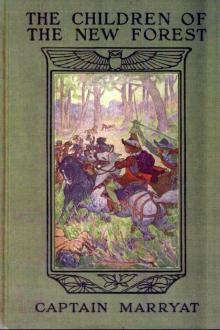 The Children of the New Forest
The Children of the New Forest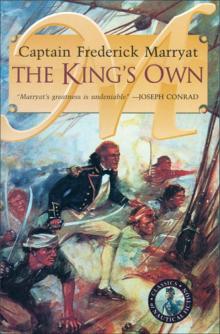 The King's Own
The King's Own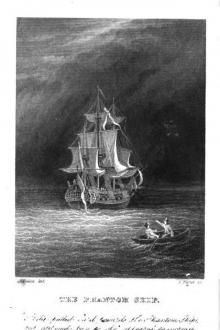 The Phantom Ship
The Phantom Ship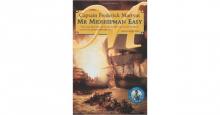 Mr. Midshipman Easy
Mr. Midshipman Easy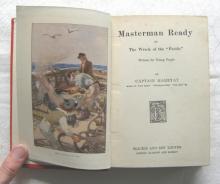 Masterman Ready; Or, The Wreck of the Pacific
Masterman Ready; Or, The Wreck of the Pacific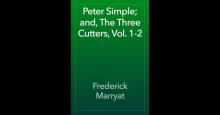 Peter Simple; and, The Three Cutters, Vol. 1-2
Peter Simple; and, The Three Cutters, Vol. 1-2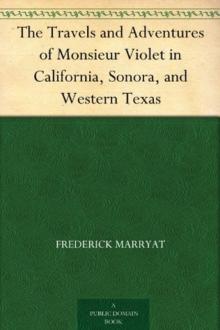 Travels and Adventures of Monsieur Violet
Travels and Adventures of Monsieur Violet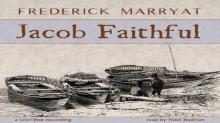 Jacob Faithful
Jacob Faithful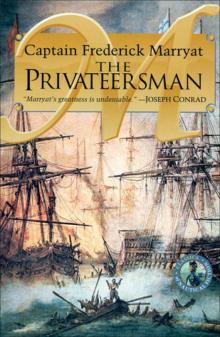 The Privateersman
The Privateersman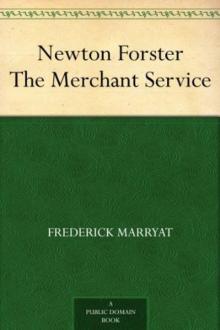 Newton Forster
Newton Forster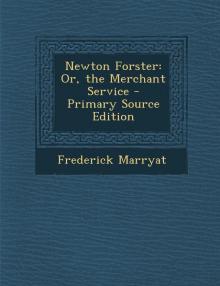 Newton Forster; Or, The Merchant Service
Newton Forster; Or, The Merchant Service The Pacha of Many Tales
The Pacha of Many Tales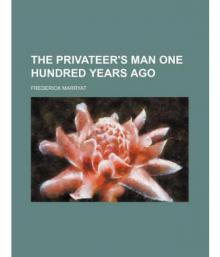 The Privateer's-Man, One hundred Years Ago
The Privateer's-Man, One hundred Years Ago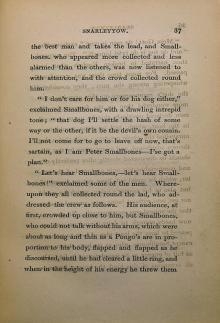 Snarleyyow, or, the Dog Fiend
Snarleyyow, or, the Dog Fiend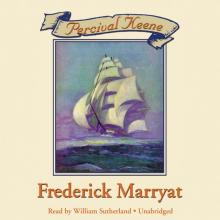 Percival Keene
Percival Keene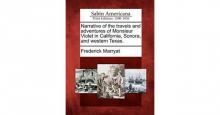 The Travels and Adventures of Monsieur Violet in California, Sonora, and Western Texas
The Travels and Adventures of Monsieur Violet in California, Sonora, and Western Texas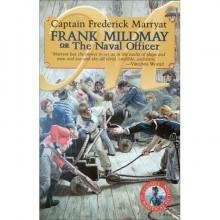 Frank Mildmay; Or, the Naval Officer
Frank Mildmay; Or, the Naval Officer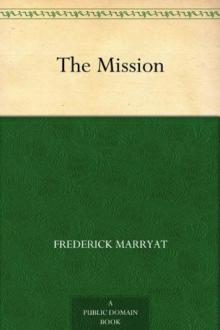 The Mission
The Mission